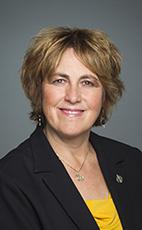Thank you for the opportunity to speak.
I would like to start by acknowledging that we are on the traditional unceded territory of the Algonquin people.
I congratulate everyone on being elected to this chamber.
I would like to take a moment to express my gratitude to the voters of Algoma—Manitoulin—Kapuskasing for placing their trust in me once again to be their representative and voice here in Parliament.
Like all of you, I did not get here without a lot of assistance. I am thinking of the campaign teams, volunteers, donors and core supporters who do so much to invigorate the democratic process and determine the shape of Parliament. These people exist across the political spectrum and are the heartbeat of our political discourse. With that, I extend a huge thank you to all those individuals who have worked so hard to get us here today.
I also send a special shout-out to my good friend Bill McBain, who has managed three of my campaigns with an infectious, positive attitude and a sense of humility that sets him apart.
Most of us also benefit from the strong support we receive from our families, and my situation is no different. My husband Kieth, daughter Mindy and her family, along with my son Shawn, who is here today, provide me with a stable foundation that allows me to dedicate the time needed for these endeavours. Last but not least are my staff, who kept my offices going during the election. This support is invaluable and irreplaceable, so I thank you for indulging me as I acknowledge these special people.
We have heard that this Parliament faces a strong challenge from Canadians who want us to make the hand that we have been dealt work. A big part of that will run right through the Speaker's chair. There is no question that decorum in the chamber can be a challenge, and this is an area I believe we can all greatly improve upon.
While we are five candidates who are asking you for your support for the Speaker's role, each one of us brings unique qualities from our past experiences that can help you understand how we might approach the role.
Over the years, I have gained many skills within the banking, mental health and education fields, as well as the criminal justice system. However, I came to politics by way of the labour movement, which is where I had the opportunity to gain experience in dispute resolution and employee-management relations. That work trained me in mediation and trained me to focus on commonalities as a productive starting point for difficult discussions. I believe my skills in this area could help foster more goodwill between all parties.
I know that running from the fourth party position can be seen as unrealistic by some. Adding to that the fact that, if elected, I would be only the second woman to serve as Speaker makes this candidacy a long shot by any standard. However, I believe that choosing a Speaker from a smaller party sends a clear signal that we are prepared to do things differently, and it would serve as a symbol of the kind of co-operation we can be capable of and that we are serious about making this Parliament work. That is what Quebeckers and Canadians have asked for.
Electing a woman as Speaker would do just that, but I am not standing here merely as a woman candidate: I am here because I can do the job. It has been 35 years since this place had its one and only female Speaker, Jeanne Sauvé, who was actually appointed.
We know that research has shown time and again that women excel in politics, do things a little differently and bring valuable perspective to the process.
Furthermore, I have experience. In my time as assistant deputy speaker in the previous Parliament, I believe I proved to be impartial, fair and open-minded. I can be decisive when required, and I have a natural inclination to seek consensus before making important rulings. I am also known for being a thorough and diligent worker, two qualities that will serve me well in the Speaker's chair.
If elected Speaker, I will work to develop clear lines of communication between the parties to ensure we are doing our very best to present a Parliament that Canadians and Quebeckers can be proud of. This will help us maximize our time spent in the chamber and give us more time to attend to the multitude of demands we face while in Ottawa.
I thank you for your patience, offer my best wishes to my colleagues who are also standing for Speaker, and once again congratulate you on your elections.
No matter the results, I look forward to working with all of you in the 43rd Parliament and delivering the results that Canadians demand and deserve.

